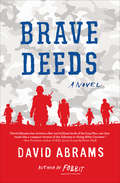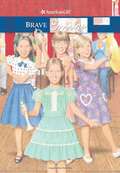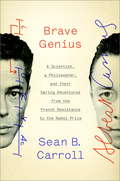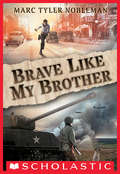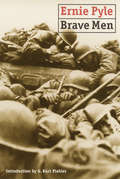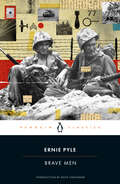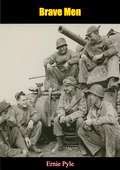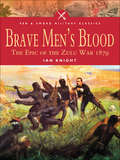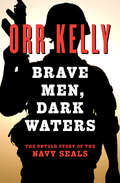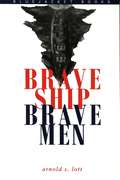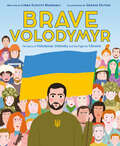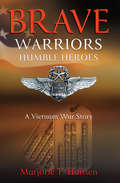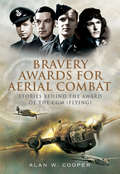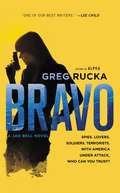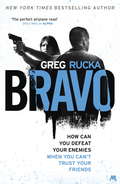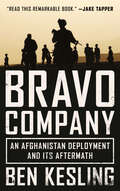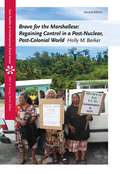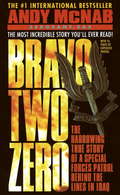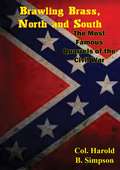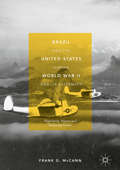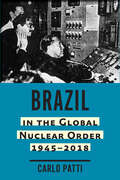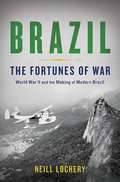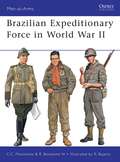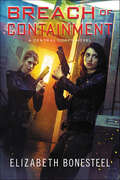- Table View
- List View
Brave Deeds: A Novel
by David AbramsFrom the author of Fobbit: “A stirring, sardonic war story . . . Mordantly funny and harrowing . . . Reminiscent of such classic war novels as Catch-22” (Tampa Bay Times). A Military Times Best Book of 2017, Brave Deeds is a compelling novel of war, brotherhood, and America. Spanning eight hours, the novel follows a squad of six AWOL soldiers as they attempt to cross war-torn Baghdad on foot to attend the funeral of their leader, Staff Sergeant Rafe Morgan. As the men make their way to the funeral, they recall the most ancient of warriors yet are a microcosm of twenty-first-century America, and subject to the same human flaws as all of us. Drew is reliable in the field but unfaithful at home; Cheever, overweight and whining, is a friend to no one—least of all himself; and platoon commander Dmitri “Arrow” Arogapoulos is stalwart, yet troubled with questions about his own identity and sexuality. Emotionally resonant, true-to-life, and thoughtfully written, Brave Deeds is a gripping story of combat and of perseverance, and an important addition to the oeuvre of contemporary war fiction. “Earnest and affecting . . . The soldiers are foulmouthed, sex-obsessed and fiercely loyal for reasons they can’t quite articulate—in other words, packed with young American male authenticity. Abrams’s prose is relaxed and conversational, with a few scattered literary nuggets that add heft, like chunks of beef in a vegetable soup. . . . The mash-up works, and Abrams’s voice is clear and strong.” —Brian Castner, The Washington Post “Outstanding . . . With a little bit of humor and bumbling grace, these six soldiers magnify what is both beautiful and despairing about the American military.” —Missoulian
Brave Emily (American Girls #7)
by Valerie TrippEmily Bennett, a young English girl, has come to stay with Molly's family to escape the bombing of London. Molly tries hard to make sweet, shy Emily feel at home, and Emily is grateful for Molly's friendship. Emily is delighted that she can help Molly with math and pleased and proud when she impresses Molly. But, it is mot until Emily makes a BIG mistake and has to rely on Molly for help that Emily shows how truly brave she is-and both girls learn what friendship really means.
Brave Genius
by Sean B. CarrollThe never-before-told account of the intersection of some of the most insightful minds of the 20th century, and a fascinating look at how war, resistance, and friendship can catalyze genius. In the spring of 1940, the aspiring but unknown writer Albert Camus and budding scientist Jacques Monod were quietly pursuing ordinary, separate lives in Paris. After the German invasion and occupation of France, each joined the Resistance to help liberate the country from the Nazis, ascended to prominent, dangerous roles, and were very lucky to survive. After the war and through twists of circumstance, they became friends, and through their passionate determination and rare talent they emerged as leading voices of modern literature and biology, each receiving the Nobel Prize in their respective fields. Drawing upon a wealth of previously unpublished and unknown material gathered over several years of research, Brave Genius tells the story of how each man endured the most terrible episode of the twentieth century and then blossomed into extraordinarily creative and engaged individuals. It is a story of the transformation of ordinary lives into exceptional lives by extraordinary events--of courage in the face of overwhelming adversity, the flowering of creative genius, deep friendship, and of profound concern for and insight into the human condition.
Brave Like My Brother
by Marc Tyler NoblemanWhen Charlie's brother, Joe, is called up to fight in World War II, he promises to write letters to ten-year-old Charlie as often as he can. It won't make up for not being there to help Charlie out with the neighborhood bullies, but it's all Joe can do. Life is tough for a soldier, and Joe tells Charlie all about it, from long hikes in endless rain and mud to the stray dog his company adopts. But when Joe is sent on a secret mission with the one soldier he can't stand, he will have to face risks that place their mission -- and their lives -- in grave danger. Charlie knew his brother was strong, but he will discover that Joe is more of a hero than he lets on. Will Joe's letters give Charlie the strength to stand up for himself and be brave, too?
Brave Men
by Ernie Howard PylePyle's stories about WWII, in Sicily June-Sept 1943, in Italy Dec 1943-April 1944, in England April-May 1944, and in France June-Sept 1944.
Brave Men
by G. Kurt Piehler Ernie PyleEurope was in the throes of World War II, and when America joined the fighting, Ernie Pyle went along. Long before television beamed daily images of combat into our living rooms, Pyle’s on-the-spot reporting gave the American public a firsthand view of what war was like for the boys on the front. Pyle followed the soldiers into the trenches, battlefields, field hospitals, and beleaguered cities of Europe. What he witnessed he described with a clarity, sympathy, and grit that gave the public back home an immediate sense of the foot soldier’s experience. There were really two wars, John Steinbeck wrote in Time magazine: one of maps and logistics, campaigns, ballistics, divisions, and regiments and the other a "war of the homesick, weary, funny, violent, common men who wash their socks in their helmets, complain about the food, whistle at Arab girls, or any girls for that matter, and bring themselves through as dirty a business as the world has ever seen and do it with humor and dignity and courage—and that is Ernie Pyle’s war." This collection of Pyle’s columns detailing the fighting in Europe in 1943–44 brings that war—and the living, and dying, moments of history—home to us once again.
Brave Men
by Ernie PyleThe classic, human-scale account of the soldiers who fought in World War II, by Pulitzer Prize winner Ernie Pyle—America&’s most famous and most loved war correspondent—featuring a new introduction by David Chrisinger, the author of the new Ernie Pyle biography, The Soldier's Truth A Penguin ClassicWhen America entered World War II, Ernie Pyle followed the soldiers into the trenches. Long before television and the internet beamed combat footage directly to us, his dispatches from the front lines augmented the coverage of the war&’s politics, strategies, and macro-level mobilizations to give the American public what he called his &“worm&’s-eye view&” of the day-to-day life of the war. He captured, as John Steinbeck described it in Time magazine, the &“war of the homesick, weary, funny, violent, common men who wash their socks in their helmets, complain about the food . . . and bring themselves through as dirty a business as the world has ever seen and do it with humor and dignity and courage—and that is Ernie Pyle&’s war.&” A number-one bestseller upon its publication in 1944, Brave Men remains unmatched in its clarity, sympathy, and grit as a portrait of America&’s boys who fought in Europe, and lives on as a testament to the enduring value of embedded journalism in reporting the truth.
Brave Men [Illustrated Edition]
by Ernie PyleIncludes over 150 images recording the career of Ernie Pyle from childhood to Ie Shima.Europe was in the throes of World War II, and when America joined the fighting, Ernie Pyle went along. Long before television beamed daily images of combat into our living rooms, Pyle’s on-the-spot reporting gave the American public a firsthand view of what war was like for the boys on the front. Pyle followed the soldiers into the trenches, battlefields, field hospitals, and beleaguered cities of Europe. What he witnessed he described with a clarity, sympathy, and grit that gave the public back home an immediate sense of the foot soldier’s experience.There were really two wars, John Steinbeck wrote in Time magazine: one of maps and logistics, campaigns, ballistics, divisions, and regiments and the other a “war of the homesick, weary, funny, violent, common men who wash their socks in their helmets, complain about the food, whistle at Arab girls, or any girls for that matter, and bring themselves through as dirty a business as the world has ever seen and do it with humor and dignity and courage—and that is Ernie Pyle’s war.” This collection of Pyle’s columns detailing the fighting in Europe in 1943-44 brings that war—and the living, and dying, moments of history—home to us once again.-Print ed.“This angle of reporting brought the front-line war back to the families of those serving in the armed forces and endeared Pyle to the troops. An essential piece of Americana for all collections.”—Library Journal“[A] classic of modern journalism.”—Kirkus Reviews
Brave Men's Blood: The Epic of the Zulu War, 1879 (Pen And Sword Military Classics Ser.)
by Ian KnightOne of the most highly regarded books on the British campaign of the nineteenth-century Anglo-Zulu War fought in southern Africa. Robust and economically self-reliant, the Zulu Kingdom—created by Shaka kaSenzangakhona—was seen as a threat to British colonialism. In December 1878, the British High Commissioner in South Africa, Sir Henry Bartle Frere, picked a quarrel with the Zulu king, Cetshwayo kaMpande, in the belief that the Zulu army—armed primarily with shields and spears—would soon collapse in the face of British Imperial might. The war began in January 1879. Three columns of British troops under the command of Lt. Gen. Lord Chelmsford invaded Zululand. Almost immediately, the war went badly wrong for the British. On January 22, the Centre Column, under Lord Chelmsford&’s personal command, was defeated at Isandlwana mountain. In one of the worst disasters of the colonial era, over 1,300 British troops and their African allies were killed. In the aftermath of Isandlwana, the Zulu reserves mounted a raid on the British border post at Rorke&’s Drift, which was held by just 145 men. After ten hours of ferocious fighting, the Zulu were driven off. Eleven of the defenders of Rorke&’s Drift were awarded the Victoria Cross. These are the best-known episodes of the war, and Rorke&’s Drift went on to inspire the classic film Zulu, which established Michael Caine as a star. Drawing on new research performed since the centenary in 1979, the author delves deeply into the causes of the war, the conditions during it, and the aftermath.
Brave Men, Dark Waters: The Untold Story of the Navy SEALs
by Orr KellyA definitive history of the US Navy&’s renowned special operations fighting force—&“the most complete in-depth study of this fabled elite unit&” (Library Journal). The legend was forged in the fires of World War II, when special units of elite navy frogmen were entrusted with dangerous covert missions in the brutal global conflict. These Underwater Demolition Teams, as they were then called, soon became known for their toughness and fearlessness, and their remarkable ability to get the job—any job—done. Years later, the renamed US Navy SEALs (for Sea, Air, and Land) continued to be a wartime force to be reckoned with throughout the remainder of the twentieth century and into the twenty-first. They served as rangers and scouts in the jungles of Vietnam, answered the call to duty in Panama, Granada, and in Saddam Hussein&’s Iraq, while developing into the very best of the best, the cream of America&’s Special Forces crop. Author Orr Kelly offers a rich and riveting history of the SEALs, covering their remarkable triumphs while not shying away from the scandals and controversies. An extraordinary portrait of extraordinary fighting men, Brave Men, Dark Waters shines a brilliant light into the darkest shadows of war, which is where the SEALs have operated for decades with awesome and deadly efficiency.
Brave Ship, Brave Men
by Arnold S. LottNimitz called this book about the USS Aaron Ward on the radar picket line in the Pacific, "the finest story of the war that I have been privileged to read."
Brave Volodymyr: The Story of Volodymyr Zelensky and the Fight for Ukraine
by Linda Elovitz MarshallFrom acclaimed author Linda Elovitz Marshall comes a picture book biography of Ukrainian President Volodymyr Zelensky that highlights the importance of standing up for what one believes in, defending freedom at all costs, and maintaining hope in the face of war’s atrocities—with stunning art from Ukrainian illustrator Grasya Oliyko. Volodymyr Zelensky wanted to make Ukraine a better, kinder, more joyful place. Born to Jewish parents, Volodymyr had much love and pride for his country. Growing up, even with Ukraine’s various conflicts, he liked to make people laugh. After university, he became a comedian and actor. But he knew humor wasn’t enough to fix his nation’s ongoing problems. So, in 2019, he ran for president—and won!Leading with honesty, heart, and humor, President Zelensky stood up for what he believed in, no matter how tough the situation. And when Ukraine was invaded, he bravely defended his country, the Ukrainian people, and their right to freedom at all costs.Featuring an author’s note, educational timeline, and more, this powerful nonfiction account beautifully captures President Volodymyr Zelensky’s journey to office and Ukraine’s fight for truth and independence amidst rising tensions.
Brave Warriors, Humble Heroes: A Vietnam War Story
by Marjorie T. HansenA wife tells of her husband&’s combat missions—and the Agent Orange exposure that changed both their lives.Through her husband&’s letters from Southeast Asia about his combat missions in Vietnam and over the Ho Chi Minh Trail in Laos in 1971 and 1972, Marge Hansen shares a gripping journey into one of the most divisive and turbulent periods in the nation&’s history. Brave Warriors, Humble Heroes: A Vietnam War Story captures in a flier&’s words the conflict, drama, frustration, heroism, and longing for home and family that mark combat missions. Through meticulous research and compelling narrative, Marge brings to readers a chance to understand what may have been only an ongoing headline in the news for those at home or a distant episode in American history for younger readers. In her voice and Charlie&’s, she captures the experience of those who serve and those who support them. For Marge and Charlie, the war was immediate and personal and has not ended; both were impacted by the legacy of Agent Orange—he from his assignment to front-line bases and she from her visit to him at one of those bases. Brave Warriors, Humble Heroes recounts the story of one war, one hero, one marriage, and one family. This book stands for all those whose voices have not been heard.
Bravery Awards for Aerial Combat: Stories Behind the Award of the CGM (Flying)
by Alan W. CooperThe first recipient was Flight Sergeant Leslie Wallace, a wireless operator with 83 Squadron, who extinguished a major fire in his Lancaster and despite his severe wounds returned to his radio until the crippled aircraft returned to England. The final CGM was awarded to Flight Sergeant John Couglan in Vietnam, when he assisted boarding casualties in the face of heavy fire from the Vietcong. In between there are a host of tales that recount incredible feats of courage.Lengthy appendices list recipients of the medal and other statistics concerning the award.
Bravo (Jad Bell #2)
by Greg RuckaThe thrilling follow-up to Alpha continues the Jad Bell series from New York Times bestselling author Greg Rucka. Still recovering from traumas both physical and emotional, Jad Bell is tasked with bringing in the Uzbek, principal organizer of the terrorist attack that nearly cost Bell his ex-wife and daughter. But the Uzbek's just the beginning: his employer, the Architect, has already set in motion another, even more devastating attack.At the center of it all are two women under deep cover. One, as beautiful as she is deadly, has just been dispatched on American soil to execute the Architect's deadly plans. The other is an American just emerging from a complex web of lies, whose intel may be the only hope Bell has to stop the assault before it begins. But after years of pretending to be somebody else, can she be trusted?
Bravo (Jad Bell)
by Greg RuckaShe is undercover. She is pretending to be in love. She is ready to attack. She is undercover. She is pretending to be in love. She is ready to protect. In the aftermath of a failed plot against America, Jad Bell and his team are sent after those behind it. But they can only find the middle man, not the mastermind. Something far worse is coming. And at the heart of it all are two women: an American spy and a terrorist operative, both living lies so deep they cannot even trust themselves. The stakes are higher, the clock is ticking, and the enemies are hiding in plain sight...
Bravo Company: An Afghanistan Deployment and Its Aftermath
by Ben KeslingA timely, powerful, and sweeping portrait of a company of men who went to war in Afghanistan, their troubled deployment, and their lives since returning home “An honest account of bravery, sacrifice, and what it means to seek redemption. As a veteran of combat himself, Ben Kesling is able to intimately and honestly document war and its aftermath in ways others haven’t.” —Jake Tapper, CNN anchor In Bravo Company, journalist and veteran Ben Kesling tells the story of the war in Afghanistan through the eyes of the men of one unit, part of a combat-hardened parachute infantry regiment in the 82nd Airborne Division. A decade ago, the soldiers of Bravo Company deployed to Afghanistan for a tour in Kandahar’s notorious Arghandab Valley. By the time they made it home, three soldiers had been killed in action, a dozen more had lost limbs, and nearly half of the company had Purple Hearts. In the decade since, two of the soldiers have died by suicide, more than a dozen have tried, and others admit they’ve considered it. Declared an “extraordinary risk” by the Department of Veterans Affairs, the members of Bravo Company were chosen as test subjects for a new approach to the veteran crisis, focusing less on individuals and more on the group. Bravo Company has an insider’s eye and ear, and draws on extensive interviews and original reporting. It follows the men from their initial enlistment and training, through their deployment and a major shift in their mission, and then on to what has happened in the decade since as they returned to combat in other units or moved on with their lives as civilians, or struggled to do so. This is a powerful, insightful, and memorable account of a war that didn’t end for these soldiers just because they came home.
Bravo For The Marshallese: Regaining Control In A Post-nuclear, Post-colonial World
by Holly M. BarkerThis case study describes the role an applied anthropologist takes to help Marshallese communities understand the impact of radiation exposure on the environment and themselves, and addresses problems stemming from the U.S. nuclear weapons testing program conducted in the Marshall Islands from 1946-1958. The author demonstrates how the U.S. Government limits its responsibilities for dealing with the problems it created in the Marshall Islands. Through archival, life history, and ethnographic research, the author constructs a compelling history of the testing program from a Marshallese perspective. For more than five decades, the Marshallese have experienced the effects of the weapons testing program on their health and their environment. This book amplifies the voice of the Marshallese who share their knowledge about illnesses, premature deaths, and exile from their homelands. The author uses linguistic analysis to show how the Marshallese developed a unique radiation language to discuss problems related to their radiation exposure problems that never existed before the testing program. Drawing on her own experiences working with the government of the Marshall Islands, the author emphasizes the role of an applied anthropologist in influencing policy, and empowering community leaders to seek meaningful remedies.
Bravo Two Zero: The Harrowing True Story of a Special Forces Patrol Behind the Lines in Iraq
by Andy McnabTheir mission: To take out the scuds. Eight went out. Five came back. Their story had been closed in secrecy. Until now. They were British Special Forces, trained to be the best. In January 1991 a squad of eight men went behind the Iraqi lines on a top secret mission. It was called Bravo Two Zero. On command was Sergeant Andy McNab. "They are the true unsung heroes of the war." -- Lt. Col. Steven Turner, American F-15E commander. Dropped into "scud alley" carrying 210-pound packs, McNab and his men found themselves surrounded by Saddam's army. Their radios didn't work. The weather turned cold enough to freeze diesel fuel. And they had been spotted. Their only chance at survival was to fight their way to the Syrian border seventy-five miles to the northwest and swim the Euphrates river to freedom. Eight set out. Five came back. "I'll tell you who destroyed the scuds -- it was the British SAS. They were fabulous." -- John Major, British Prime Minister. This is their story. Filled with no-holds-barred detail about McNab's capture and excruciating torture, it tells of men tested beyond the limits of human endurance... and of the war you didn't see on CNN. Dirty, deadly, and fought outside the rules.
Brawling Brass, North and South: The Most Famous Quarrels of the Civil War
by Col. Harold B. SimpsonOriginally published in 1960, this book contains the fascinating accounts of the most famous quarrels of the Civil War, involving Stonewall Jackson and A. P. Hill; Jos. E. Johnston and John B. Hood; Robert E. Lee and James Longstreet; George Meade and Dan Sickles; Phil Sheridan and Gouverneur K. Warren; and John Pope and Fitz-John Porter.“The War of the Sixties has probably had more written about it than any war in our history. It is estimated that there have been over 40,000 books written about this great conflict since Appomattox. Even with this tremendous production of written material, there still exists many facets of the war that the researcher has not fully explored or developed. This book concerns itself with such an area—an account of the bickering, quarreling and squabbling that existed in the high commands on both sides.”—Harold B. Simpson, Foreword
Brazil and the United States during World War II and Its Aftermath: Negotiating Alliance and Balancing Giants
by Frank D. McCannThe military alliance between the United States and Brazil played a critical role in the outcome of World War II, and yet it is largely overlooked in historiography of the war. In this definitive account, Frank McCann investigates Brazilian-American military relations from the 1930s through the years after the alliance ended in 1977. The two countries emerge as imbalanced giants with often divergent objectives and expectations. They nevertheless managed to form the Brazilian Expeditionary Force and a fighter squadron that fought in Italy under American command, making Brazil the only Latin American country to commit troops to the war. With the establishment of the US Air Force base in Natal, Northeast Brazil become a vital staging area for air traffic supplying Allied forces in the Middle East and Asian theaters. McCann deftly analyzes newly opened Brazilian archives and declassified American intelligence files to offer a more nuanced account of how this alliance changed the course of World War II, and how the relationship deteriorated in the aftermath of the war.
Brazil in the Global Nuclear Order, 1945–2018 (Johns Hopkins Nuclear History and Contemporary Affairs)
by Carlo PattiThe first comprehensive and definitive history of Brazil's decision to give up the nuclear weapon option.Why do countries capable of "going nuclear" choose not to? Brazil, which gained notoriety for developing a nuclear program and then backtracking into adherence to the nonproliferation regime, offers a fascinating window into the complex politics surrounding nuclear energy and American interference. Since the beginning of the nuclear age, author Carlo Patti writes, Brazil has tried to cooperate with other countries in order to master nuclear fuel cycle technology, but international limitations have constrained the country's approach. Brazil had the start of a nuclear program in the 1950s, which led to the United States interfering in agreements between Brazil and other countries with advanced nuclear industries, such as France and West Germany. These international constraints, especially those imposed by the United States, partly explain the country's decision to create a secret nuclear program in 1978 and to cooperate with other countries outside the Nuclear Non-Proliferation Treaty [NPT] regime, such as Argentina and China. Yet, in 1998, Brazil chose to adhere to the Nuclear Non-Proliferation Treaty it so actively opposed only three decades prior, although the country still critiques the unfair nature of the treaty. Patti draws on recent declassified primary sources collected during years of research in public and private archives in eight different countries, as well as interviews with former presidents, diplomats, and scientists, to show how US nonproliferation policies deeply affected Brazil's decisions. Assessing the domestic and international factors that informed the evolution of Brazil's nuclear diplomacy, Brazil in the Global Nuclear Order, 1945-2018 also discusses what it means with respect to Brazil's future political goals.
Brazil: The Fortunes of War
by Neill LocheryIn 1939, Brazil seemed a world away from the chaos overtaking Europe. Yet despite its bucolic reputation as a distant land of palm trees and pristine beaches, Brazil's natural resources and proximity to the United States made it strategically invaluable to both the Allies and the Axis alike. As acclaimed historian Neill Lochery reveals in The Fortunes of War, Brazil's wily dictator Getúlio Dornelles Vargas keenly understood his country's importance, and played both sides of the escalating global conflict off against each other, gaining trade concessions, weapons shipments, and immense political power in the process. Vargas ultimately sided with the Allies and sent troops to the European theater, but not before his dexterous geopolitical machinations had transformed Rio de Janeiro into one of South America's most powerful cities and solidified Brazil's place as a major regional superpower.A fast-paced tale of diplomatic intrigue, The Fortunes of War reveals how World War II transformed Brazil from a tropical backwater into a modern, global power.
Brazilian Expeditionary Force in World War II
by Ramiro Bujeiro Cesar MaximianoIn the English-speaking world, it is generally unknown that a volunteer Brazilian Expeditionary Force (FEB) fought alongside the US Army in Italy from mid-1944 until the end of the war. This was in effect a light infantry division, consisting of three infantry regiments augmented with artillery and light armour. It was supported by a Brazilian Air Force contingent of a light reconnaissance squadron as well as a P-47 Thunderbolt-equipped fighter squadron. Although all weapons, uniform, kit and equipment were either American-supplied or American models, there were distinctive Brazilian adaptations to uniforms and other key pieces of kit. This is a seriously researched volume on a little-studied subject matter complete with a range of previously unpublished photographs and specially commissioned artwork plates.
Breach of Containment: A Central Corps Novel
by Elizabeth BonesteelA reluctant hero must prevent war in space and on Earth in this fast-paced military science fiction thriller from the author of The Cold Between and Remnants of Trust—a page-turning hybrid combining the gritty, high-octane thrills of James S. A. Corey and the sociopolitical drama of Ann Leckie.Space is full of the unknown . . . most of it ready to kill you.When hostilities between factions threaten to explode into a shooting war on the moon of Yakutsk, the two major galactic military powers, Central Corps and PSI, send ships to defuse the situation. But when a strange artifact is discovered, events are set in motion that threaten the entire colonized galaxy—including former Central Corps Commander Elena Shaw.Now an engineer on a commercial shipping vessel, Elena finds herself drawn into the conflict when she picks up the artifact on Yakutsk—and investigation of it uncovers ties to the massive, corrupt corporation Ellis Systems, whom she’s opposed before. Her safety is further compromised by her former ties to Central Corps—Elena can’t separate herself from her past life and her old ship, the CCSS Galileo.Before Elena can pursue the artifact’s purpose further, disaster strikes: all communication with the First Sector—including Earth—is lost. The reason becomes apparent when news reaches Elena of a battle fleet, intent on destruction, rapidly approaching Earth. And with communications at sublight levels, there is no way to warn the planet in time.Armed with crucial intel from a shadowy source and the strange artifact, Elena may be the only one who can stop the fleet, and Ellis, and save Earth. But for this mission there will be no second chances—and no return.
